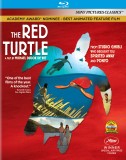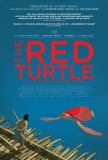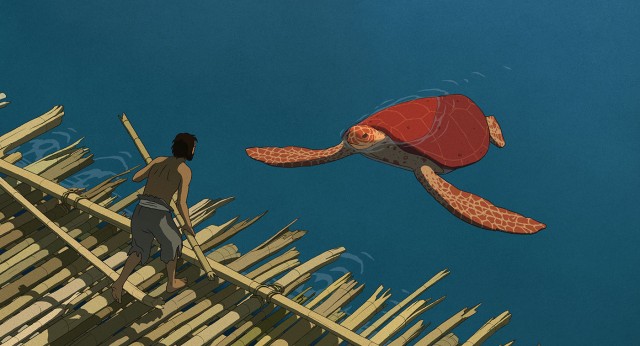The Red Turtle Movie Review

The Red Turtle is now available on home video. Read our review of the Blu-ray.
 |
The Red Turtle (La tortue rouge)
US Theatrical Release: November 18, 2016 (French Release: June 29, 2016) / Running Time: 80 Minutes / Rating: PG Director: Michaël Dudok de Wit / Writers: Michaël Dudok de Wit (original story, screenplay & adaptation), Pascale Ferran (adaptation) |
Buy The Red Turtle from Amazon.com: Blu-ray • DVD • Instant Video
Most of the output of Studio Ghibli can be attributed to two writer-directors, Isao Takahata and the revered Hayao Miyazaki. At 76, Miyazaki is sort of retired and Takahata, 81, has only directed one film in the past ten years. The Red Turtle, Ghibli's latest and their sixth film to receive an Academy Award nomination for Best Animated Feature, sees the studio collaborating with Wild Bunch, a Germany-based film sales and distribution company. This original film is directed and co-written by Michaël Dudok de Wit, a London-based Dutch animator who won a Best Animated Short Oscar for 2000's Father and Daughter.
Red Turtle sees a man become shipwrecked on a desert island. He does what most castaways would: look for food and try to find a way back to civilization. When the raft he builds is destroyed by a red turtle as large as him, he stomps on the animal and puts it on its back to die. Later, he is filled with remorse, only to discover that the red turtle has transformed to a beautiful woman who is alive and now his only company besides crabs, seals, and other aquatic life. The man and woman live their lives as castaways, giving birth to a son and enduring certain challenges.
I guess by now I should point out that The Red Turtle has no dialogue. The screenplay, which also credits France's Pascale Ferran (Lady Chatterley, Bird People) with adaptation, must have largely consisted of stage directions, Red Turtle does not suffer from its lack of dialogue. It tells its story with Ghibli's tasteful signature 2D visuals and an appealing score by Laurent Perez del Mar, also of France. The design does not particularly present additional challenges for adults open-minded enough to be watching a foreign animated film. Plenty of children, however, probably will be bored, unfortunately, and unwilling or unable to appreciate the poetry of the presentation, which should be evident for the niche audience that Sony Pictures Classics must be targeting on this limited North American theatrical release.
Red Turtle's Oscar nomination makes it along with My Life as a Zucchini one of two obscure foreign 'toons sharing the Animated Feature category with the Disney blockbusters Zootopia and Moana and Laika's widely-released and fairly respected Kubo and the Two Strings. The Academy has regularly nominated international works with minimal commercial prospects for Best Animated Feature, but since Miyazaki's Spirited Away won in 2002-03, the actual award has almost exclusively gone to computer-animated, family-friendly American films with nine or even ten-figure domestic grosses. That suggests Disney will continue their domination of the Oscar that, between Pixar and their much older in-house animation branch, they haven't lost since 2011-12.
Nonetheless, The Red Turtle deserves to be seen, not merely to check off a box on your pre-Oscar viewing list, but to appreciate for a different artistic approach to a medium whose vast possibilities are too rarely explored.
Buy The Red Turtle from Amazon.com: Blu-ray / DVD / Instant Video
|
Related Reviews:
DVDizzy.com | DVD and Blu-ray Reviews | New and Upcoming DVD & Blu-ray Schedule | Upcoming Cover Art | Search This Site
DVDizzy.com Top Stories:
The Red Turtle (Blu-ray)
2016 Best Animated Feature Nominees: Kubo and the Two Strings • Zootopia • Moana
Studio Ghibli: From Up on Poppy Hill • Castle in the Sky • My Neighbor Totoro • Howl's Moving Castle • Grave of the Fireflies • Ponyo
Now in Theaters: Toni Erdmann • Elle • The Founder • The Comedian • Gold • Rings • The Space Between Us
The Wild Life • When the Wind Blows • Swiss Army Man
Text copyright 2017 DVDizzy.com. Images copyright 2016 Sony Pictures Classics.
Unauthorized reproduction prohibited.

